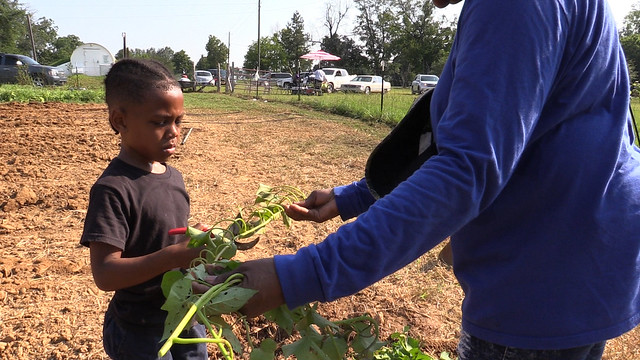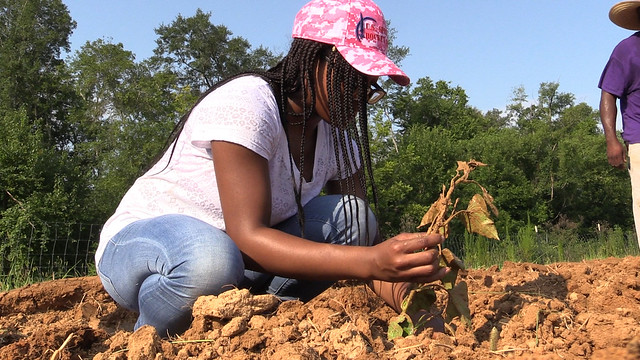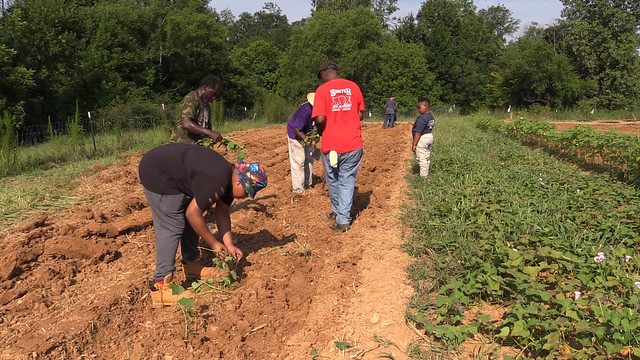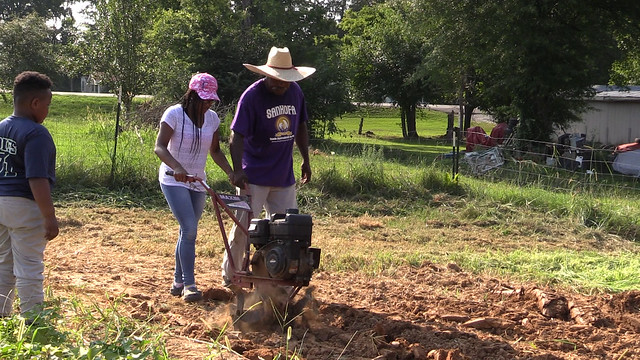Community gardens change lives through healthy diets, community spirit
Article body
Residents of Geiger, a small community in Sumter County, Alabama, drive more than 20 miles to reach a grocery store. They admit that this makes healthy eating a challenge. More than 35 percent of the county’s population lives below the poverty level, and obesity tops 40 percent.
But a multiyear partnership with Alabama Extension at Auburn University has helped Geiger residents make important changes not only in their diets but also in their community.
Working with Extension professionals leading the ALProHealth program, residents now nurture a thriving community garden. The garden provides fresh fruits and vegetables to residents in this tiny west Alabama community.
“We are trying to get everyone fresh fruits and fresh vegetables because the closest store to us is 23 miles away,” said Jimmy Williams, a Geiger community leader. “We go through town and give the produce to people. We are teaching them to eat healthy and live longer.”
Williams says the program is about more than healthy eating and living.
“Working in a garden or in a setting like this, you begin to talk about things, and it helps bring you together,” he said. “People that live together should work together and become one. I think our garden has helped us do that.”
A four-year effort supported by a grant from the Centers for Disease Control and Prevention, ALProHealth aims to prevent and reduce obesity by supporting community coalitions that focus on health and wellness in 13 counties where adult obesity is greater than 40 percent.
Barbara Struempler, Extension’s leader for ALProHealth, says the Geiger community garden is just one success story.
“You will find success stories in every county where ALProHealth is working,” said Struempler, who is also a professor in Auburn’s College of Human Sciences. “These efforts are succeeding because ALProHealth works with community coalitions to develop programs tailored to that county. What works for Sumter County might not be what the residents in Pickens County need.”
“These community coalitions also foster engagement and enhance community pride,” Struempler continued.
Across Alabama, ALProHealth and its partners focus on three key strategies.
-
Creating community programs and resources including community gardens, school gardens and health classes
-
Increasing healthy eating options by working with retailers, farmers markets and concession vendors
-
Developing safe places for physical activity, such as playgrounds and parks
In 2014, Alabama Extension at Auburn University received one of the first CDC grants to land grant universities, receiving more than $4 million over four years.
“The CDC recognized the benefits of partnering with land grant universities,” said Paul Brown, Alabama Extension associate director. “Extension has access to both the multidisciplinary research and educational resources of the entire university as well as the network of partners and existing relationships with local communities across Alabama.”
Community coalitions have been very successful in using their relationships with local businesses and government agencies to leverage grant funds to procure additional funds and contributions to supplement their work.
Struempler said, “Coalition groups, through their work with partners, added more than $3 million additional dollars to support their programs. Of this amount, volunteer hours account for about $1.1 million, in-kind donations for another $1 million and additional grants for more than $987,000.
“In other words, three-fourths of the four-year CDC funding was matched by funding and resources from the communities. This was a bonus for the communities.”
Brown notes that this leveraging of resources represents an important step for the communities.
“County coalitions are looking to the future to ensure project sustainability by working with local governments and other community stakeholders,” he said.
The success of ALProHealth is visible beyond the community leaders. Struempler reports that Alabama Extension was recently awarded a second grant of $5 million from the CDC to continue the transformational program.
“We are excited that the CDC has chosen to fund ALProHealth for another five years,” she said.
ALProHealth goals include improving regional food systems to support long-term accessibility of healthier foods; increasing purchase and selection of healthier foods; and increasing use of pedestrian, bicycle and transit transportation systems.
“In the first three years, ALProHealth has helped communities begin to change how they eat and live. Thanks to the continued CDC grant funding, Alabama will not look the same in five years.”
ALProHealth accomplishments:
-
Established, expanded or supported 16 school-based gardens
-
Enhanced in-school physical activity opportunities at four high schools and three elementary schools by updating playgrounds and physical education equipment and infrastructure
-
Established seven farmers markets
-
Enhanced 10 farmers markets by providing promotional materials and portable shade structures
-
Enhanced safety and usefulness of 26 community spaces
-
Updated children’s play areas in 11 community parks
-
Increased opportunities for physical activity by installing exercise equipment along walking trails in 11 parks
-
Established or enhanced 22 community gardens
-
Increased food storage capacity at eight food banks supporting the distribution of fresh fruits and vegetables
Related Media
Media interested in this story can contact Communications Director Preston Sparks at (334) 844-9999 or preston.sparks@auburn.edu.
Auburn University is a nationally ranked land grant institution recognized for its commitment to world-class scholarship, interdisciplinary research with an elite, top-tier Carnegie R1 classification, life-changing outreach with Carnegie’s Community Engagement designation and an undergraduate education experience second to none. Auburn is home to more than 30,000 students, and its faculty and research partners collaborate to develop and deliver meaningful scholarship, science and technology-based advancements that meet pressing regional, national and global needs. Auburn’s commitment to active student engagement, professional success and public/private partnership drives a growing reputation for outreach and extension that delivers broad economic, health and societal impact.








